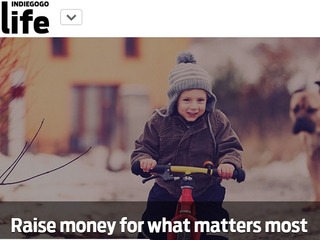
(Come mingle with hundreds of top venture capitalists representing $10B-plus in capital under management, including Khosla Ventures, Greylock and Javelin Venture Partners, and learn from founders/CEOs including Marco Zappacosta, Co-founder & CEO of Thumbtack and Adam Goldenberg, CEO of JustFab, Slava Rubin, Founder & CEO of Indiegogo, at Vator Splash Oakland on April 22nd and 23rd. Get your tickets here!)
When I think of crowdfunding sites, the two that come to mind right away are Kickstarter and Indiegogo. There are some difference in how the two operate: both offer a place for creative people to fund their projects, but only Indiegogo also allows for charity and causes, both of which are expressly prohibited on Kickstarter.
Beyond that, though, there is one crucial bit of different between the two: only on Indiegogo can people who start campaigns that fail to meet their goal actually still wind up walking away with money.
The site offers two different types of funding: flexible and fixed. And the amount that the campaign creator will earn depends on which of these two options they pick.
The fixed funding option is the same “all or nothing” type deal that Kickstarter offers: if the campaign does not reach its goal, then the money donated is returned. If it does reach its, then Indiegogo take 4% of what it earned.
Flexible funding, however, means that, no matter what, the creator of the campaign will make money. How much they pay Indiegogo, however, depends on if the campaign meet its goal. If it does, then they pay the same 4% as the fixed funding option. If it doesn’t, then they get to keep the money, but have to pay Indiegogo 9% of the donations raised.
The higher fee “encourages campaign owners to set reasonable goals and promote their campaigns,” Indiegogo says.
The idea behind flexible funding comes around, again, to what separates the two companies. This option wouldn’t work for a campaign designed for a project, which would require a minimum to get off the ground; if that campaign fails, then that money will be wasted. Flexible funding does work in situations where the amount raised does not matter, as in someone needing to pay medical bills. In that case, just getting any amount would help.
In addition to those fees, campaign creators also have to 3% to 5% for credit card or PayPal processing, which varies depending on their financial institution.
If they run a non-US campaign and have raised funds in USD via Direct Credit Card, Indiegogo also charges a $25 wire fee.
Launched in 2008 Indiegogo says that is has hosted more than 300,000 campaigns in that time, with more than 15 million people visiting the site every month, and about 7,000 campaigns live on the site at any given time.
47% of campaigns that reach their goals on Indiegogo are run by women, and about 30% of Indiegogo campaigns are launched outside the United States.
The company has raised over $56.5 million in venture funding, from investors that have included KleinerPerkins Caufield & Byers, Metamorphic Ventures, ff Venture Capital, Virgin Group founder Sir Richard Branson; Affirm CEO Max Levchin; Yahoo’s chairman of the board Maynard Webb; and Draper Fisher Jurvetson Founding Partner Tim Draper.



















